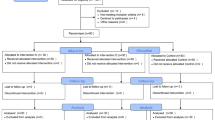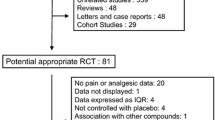Abstract
Purpose
Postoperative nausea and vomiting (PONV) occurs frequently after bariatric surgery and is a major cause of adverse outcomes. This retrospective study investigated whether opioid-restricted total intravenous anesthesia using dexmedetomidine as a substitute for remifentanil can reduce PONV in bariatric surgery.
Materials and Methods
The electronic medical records of adult patients who underwent laparoscopic bariatric surgery between January and December 2019 were reviewed. The patients were divided into two groups according to the agents used for anesthesia: Group D, propofol and dexmedetomidine; Group R, propofol and remifentanil.
Results
A total of 134 patients were included in the analyses. The frequency of postoperative nausea was significantly lower in Group D than that in Group R until 2 h after discharge from the postanesthesia care unit (PACU) (P = 0.005 in the PACU, P = 0.010 at 2 h after PACU discharge) but failed to significantly reduce the overall high incidence rates of 60.5% and 65.5%, respectively (P = 0.592). Postoperative pain score was significantly lower in Group D until 6 h after PACU discharge. The rates of rescue antiemetic and analgesic agent administration in the PACU were significantly lower in Group D than those in Group R.
Conclusion
Opioid-restricted total intravenous anesthesia using dexmedetomidine reduces postoperative nausea, pain score, antiemetic, and analgesic requirements in the immediate postoperative period after bariatric surgery.
Graphical abstract


Similar content being viewed by others
References
Ohta M, Seki Y, Wong SKH, et al. Bariatric/metabolic surgery in the Asia-Pacific region: APMBSS 2018 Survey. Obes Surg. 2019;29(2):534–41. https://doi.org/10.1007/s11695-018-3539-7.
An SN, Park HY, Oh SH, et al. Cost-effectiveness of bariatric surgery for people with morbid obesity in South Korea. Obes Surg. 2020;30(1):256–66. https://doi.org/10.1007/s11695-019-04122-w.
Groene P, Eisenlohr J, Zeuzem C, et al. Postoperative nausea and vomiting in bariatric surgery in comparison to non-bariatric gastric surgery. Videosurg Miniinv. 2019;14(1):90–5. https://doi.org/10.5114/wiitm.2018.77629.
Halliday TA, Sundqvist J, Hultin M, et al. Post-operative nausea and vomiting in bariatric surgery patients: an observational study. Acta Anaesth Scand. 2017;61(5):471–9. https://doi.org/10.1111/aas.12884.
Suh S, Helm M, Kindel TL, et al. The impact of nausea on post-operative outcomes in bariatric surgery patients. Surg Endosc. 2020;34(7):3085–91. https://doi.org/10.1007/s00464-019-07058-5.
Pandolfino JE, Krishnamoorthy B, Lee TJ. Gastrointestinal complications of obesity surgery. MedGenMed. 2004;6(2):15.
Gan TJ, Belani KG, Bergese S, et al. Fourth consensus guidelines for the management of postoperative nausea and vomiting. Anesth Analg. 2020;131(2):411–48. https://doi.org/10.1213/Ane.0000000000004833.
Frauenknecht J, Kirkham KR, Jacot‐Guillarmod A, et al. Analgesic impact of intra‐operative opioids vs. opioid‐free anaesthesia: a systematic review and meta‐analysis. Anaesthesia. 2019;74(5):651–62. https://doi.org/10.1111/anae.14582.
Grape S, Kirkham KR, Frauenknecht J, et al. Intra‐operative analgesia with remifentanil vs. dexmedetomidine: a systematic review and meta‐analysis with trial sequential analysis. Anaesthesia. 2019;74(6):793–800. https://doi.org/10.1111/anae.14657.
Hamed JME, Refaat HSM, Al-Wadaani H. Dexmedetomidine compared to remifentanil infusion as adjuvant to sevoflurane anesthesia during laparoscopic sleeve gastrectomy. Anesth Essays Res. 2019;13(4):636–42. https://doi.org/10.4103/aer.AER_126_19.
Kruthiventi SC, Hofer RE, Warner ME, et al. Postoperative nausea and vomiting after bariatric surgery and dexmedetomidine anesthetic: a propensity-weighted analysis. Surg Obes Relat Dis. 2020;16(4):545–53. https://doi.org/10.1016/j.soard.2020.01.007.
Tufanogullari B, White PF, Peixoto MP, et al. Dexmedetomidine infusion during laparoscopic bariatric surgery: the effect on recovery outcome variables. Anesth Analg. 2008;106(6):1741–8. https://doi.org/10.1213/ane.0b013e318172c47c.
Ziemann-Gimmel P, Goldfarb AA, Koopman J, et al. Opioid-free total intravenous anaesthesia reduces postoperative nausea and vomiting in bariatric surgery beyond triple prophylaxis. Brit J Anaesth. 2014;112(5):906–11. https://doi.org/10.1093/bja/aet551.
Watanabe T, Moriya K, Tsubokawa N, Baba H. Effect of remifentanil on postoperative nausea and vomiting: a randomized pilot study. J Anesth. 2018;32(5):781–5. https://doi.org/10.1007/s00540-018-2550-4.
Oh AY, Kim JH, Hwang JW, et al. Incidence of postoperative nausea and vomiting after paediatric strabismus surgery with sevoflurane or remifentanil-sevoflurane. Br J Anaesth. 2010;104(6):756–60. https://doi.org/10.1093/bja/aeq091.
Rama-Maceiras P, Ferreira TA, Molins N, et al. Less postoperative nausea and vomiting after propofol plus remifentanil versus propofol plus fentanyl anaesthesia during plastic surgery. Acta Anaesth Scand. 2005;49(3):305–11. https://doi.org/10.1111/j.1399-6576.2005.00650.x.
Hara R, Hirota K, Sato M, et al. The impact of remifentanil on incidence and severity of postoperative nausea and vomiting in a university hospital-based ambulatory surgery center: a retrospective observation study. Korean J Anesthesiol. 2013;65(2):142–6. https://doi.org/10.4097/kjae.2013.65.2.142.
Apfel CC, Bacher A, Biedler A, et al. A factorial trial of six interventions for the prevention of postoperative nausea and vomiting. Results of the International Multicenter Protocol to assess the single and combined benefits of antiemetic strategies in a controlled clinical trial of a 2x2x2x2x2x2 factorial design (IMPACT). Anaesthesist. 2005;54(3):201–9. https://doi.org/10.1007/s00101-005-0803-8.
Kars MS, Mori BV, Ahn S, et al. Fentanyl versus remifentanil-based TIVA for pediatric scoliosis repair: does it matter? Region Anesth Pain M. 2019;44(6):627–31. https://doi.org/10.1136/rapm-2018-100217.
Dershwitz M, Michalowski P, Chang YC, et al. Postoperative nausea and vomiting after total intravenous anesthesia with propofol and remifentanil or alfentanil: how important is the opioid? J Clin Anesth. 2002;14(4):275–8. https://doi.org/10.1016/S0952-8180(02)00353-7.
Del Gaudio A, Ciritella P, Perrotta F, et al. Remifentanil vs fentanyl with a target controlled propofol infusion in patients undergoing craniotomy for supratentorial lesions. Minerva Anestesiol. 2006;72(5):309–19.
Gaszynski TM, Strzelczyk JM, Gaszynski WP. Post-anesthesia recovery after infusion of propofol with remifentanil or alfentanil or fentanyl in morbidly obese patients. Obes Surg. 2004;14(4):498–503; discussion 4. https://doi.org/10.1381/096089204323013488.
Hozumi J, Egi M, Sugita S, Sato T. Dose of intraoperative remifentanil administration is independently associated with increase in the risk of postoperative nausea and vomiting in elective mastectomy under general anesthesia. J Clin Anesth. 2016;34:227–31. https://doi.org/10.1016/j.jclinane.2016.04.018.
Li SS, Liu TJ, Xia JM, Jia J, Li WX. Effect of dexmedetomidine on prevention of postoperative nausea and vomiting in pediatric strabismus surgery: a randomized controlled study. Bmc Ophthalmol. 2020;20(1):86. https://doi.org/10.1186/s12886-020-01359-3.
Song Y, Shim JK, Song JW, et al. Dexmedetomidine added to an opioid-based analgesic regimen for the prevention of postoperative nausea and vomiting in highly susceptible patients a randomised controlled trial. Eur J Anaesth. 2016;33(2):75–83. https://doi.org/10.1097/Eja.0000000000000327.
Egan TD, Minto CF, Hermann DJ, et al. Remifentanil versus alfentanil - comparative pharmacokinetics and pharmacodynamics in healthy adult male volunteers. Anesthesiology. 1996;84(4):821–33. https://doi.org/10.1097/00000542-199604000-00009.
Kapila A, Glass PSA, Jacobs JR, et al. Measured context-sensitive half-times of remifentanil and alfentanil. Anesthesiology. 1995;83(5):968–75. https://doi.org/10.1097/00000542-199511000-00009.
Bataille A, Letourneulx JF, Charmeau A, et al. Impact of a prophylactic combination of dexamethasone-ondansetron on postoperative nausea and vomiting in obese adult patients undergoing laparoscopic sleeve gastrectomy during closed-loop propofol-remifentanil anaesthesia: a randomised double-blind placebo-controlled study. Eur J Anaesth. 2016;33(12):898–905. https://doi.org/10.1097/Eja.0000000000000427.
Aftab H, Fagerland MW, Gondal G, et al. Pain and nausea after bariatric surgery with total intravenous anesthesia versus desflurane anesthesia: a double blind, randomized, controlled trial. Surg Obes Relat Dis. 2019;15(9):1505–12. https://doi.org/10.1016/j.soard.2019.05.010.
Apfel CC, Laara E, Koivuranta M, et al. A simplified risk score for predicting postoperative nausea and vomiting - conclusions from cross-validations between two centers. Anesthesiology. 1999;91(3):693–700. https://doi.org/10.1097/00000542-199909000-00022.
Apfel CC, Heidrich FM, Jukar-Rao S, et al. Evidence-based analysis of risk factors for postoperative nausea and vomiting. Br J Anaesth. 2012;109(5):742–53. https://doi.org/10.1093/bja/aes276.
Gan TJ. Mechanisms underlying postoperative nausea and vomiting and neurotransmitter receptor antagonist-based pharmacotherapy. CNS Drugs. 2007;21(10):813–33. https://doi.org/10.2165/00023210-200721100-00003.
Horn CC, Wallisch WJ, Homanics GE, et al. Pathophysiological and neurochemical mechanisms of postoperative nausea and vomiting. Eur J Pharmacol. 2014;722:55–66. https://doi.org/10.1016/j.ejphar.2013.10.037.
Author information
Authors and Affiliations
Contributions
The authors have contributed equally to this work.
Corresponding author
Ethics declarations
Ethics Approval
All procedures in this study were performed in accordance with the ethical standards of the institutional and/or national research committee, the 1964 Declaration of Helsinki and its later amendments, and/or comparable ethical standards.
Consent to Participate
Informed consent does not apply.
Conflict of Interest
The authors declare no competing interests.
Additional information
Publisher’s Note
Springer Nature remains neutral with regard to jurisdictional claims in published maps and institutional affiliations.
Key Points
• The incidence of postoperative nausea following bariatric surgery is very high.
• Opioid-restricted anesthesia using dexmedetomidine reduces postoperative nausea.
• Opioid-restricted anesthesia using dexmedetomidine reduces postoperative pain score.
Rights and permissions
Springer Nature or its licensor holds exclusive rights to this article under a publishing agreement with the author(s) or other rightsholder(s); author self-archiving of the accepted manuscript version of this article is solely governed by the terms of such publishing agreement and applicable law.
About this article
Cite this article
Nam, S.W., Oh, AY., Koo, BW. et al. Effect of Dexmedetomidine Compared to Remifentanil During Bariatric Surgery on Postoperative Nausea and Vomiting: a Retrospective Study. OBES SURG 32, 3368–3374 (2022). https://doi.org/10.1007/s11695-022-05894-4
Received:
Revised:
Accepted:
Published:
Issue Date:
DOI: https://doi.org/10.1007/s11695-022-05894-4




